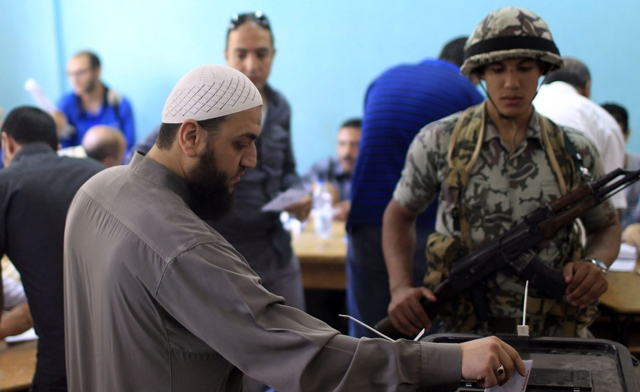On 6/14/2012, just days before Egypt’s runoff presidential election, Egypt’s High Court announced the dissolution of Parliament. Rather than the (elected) Parliament appointing representatives to draft a constitution, the entire process will be overseen by the Supreme Council of Armed Forces (SCAF). We can rest assured that this constitution will ensure the Army a prominent place in power, and limit the power of the elected government.
Simultaneously, the Court affirmed the candidacy of Ahmed Shafiq, the final Prime Minister under former President Hosni Mubarak, despite the post-revolution law which explicitly barred former Mubarak-administration officials from running in civilian elections. These developments come on the back of a number of rollbacks of post-Mubarak reforms. How did we get here?
After Hosni Mubarak refused to step down on February 1, 2011, the Army removed him from power (later, placing him under arrest). The next day, Vice-President Suleiman announced that Mubarak had, in fact, resigned (although these words never came out of Mubarak’s mouth); it was also declared that the SCAF would assume “temporary” control of the government, until a constitution was drafted and elections were held.
In November 2011, the SCAF authorized the “Selmy Document,” which contained the following significant provisions:
- Any forthcoming civilian government would not have tactical control of the military (unlike the American system where Congress and the President set the agenda, which the Army is bound to execute).
- The elected government would have no oversight/control over the military budget
- The Army would forever serve as the “Protector of Legitimacy,” with the right to remove any elected government, at any time.
- The Army had ultimate approval/veto power for the forthcoming constitution, and any laws passed by the Parliament.
Thereafter, the Islamists (specifically, the Muslim Brotherhood, the Nour Party, and others) were overwhelmingly elected to Parliament (despite the consistent portrayal of the Revolution as liberal and secularist), winning nearly 70% of the available seats . While the powers of the President and Parliament are still vague, absent a constitution – with a Muslim Brotherhood president (Muhammad Morsi, who won the first round in the presidential election) and such a strong majority in Parliament, the civilian government could be unified in such a way as to be a legitimate counterweight to the army.
However, running against Mursi in the presidential runoff is the Ahmed Shafiq, the final Prime Minister under Hosni Mubark (whom Shafiq has described as his role model). Shafiq ran on a platform to ensure stability with an “iron fist,” to roll back some of the reforms of the revolution, and to purge the government of Islamists (who have been a problem for the military from the time the government was instituted).
In order to win the presidency, Shafiq aims to stoke the fears that liberals, secularists, and religious minorities have about such a strong Islamist influence on the state; should he get enough of these to turn out for him, he could easily win the election (towards that end, he recently asserted that he would be happy to appoint a Christian woman as his vice-president).
Following the presidential election, and the drafting of the new constitution, the SCAF will oversee another set of Parliamentary elections (this action should also be understood in light of their March 2012 expulsion of foreign NGO’s from the country; the SCAF will have much more control over the democratic process, with less oversight and influence from external parties). It seems to be the SCAF’s hope that the Islamists will have a weaker showing, and the aforementioned alternative factions will do better.
The result will be a divided Parliament, thereby ensuring that whatever powers the Parliament has will be difficult to actually exercise— at the very least, the SCAF can hope for an alternative alliance sufficient to act a foil for the Muslim Brotherhood. The result would be a total erosion of checks and balances on the military by the civilian government—a de facto coup: the Regime would be back (sans the Mubaraks), and not a moment too soon.

